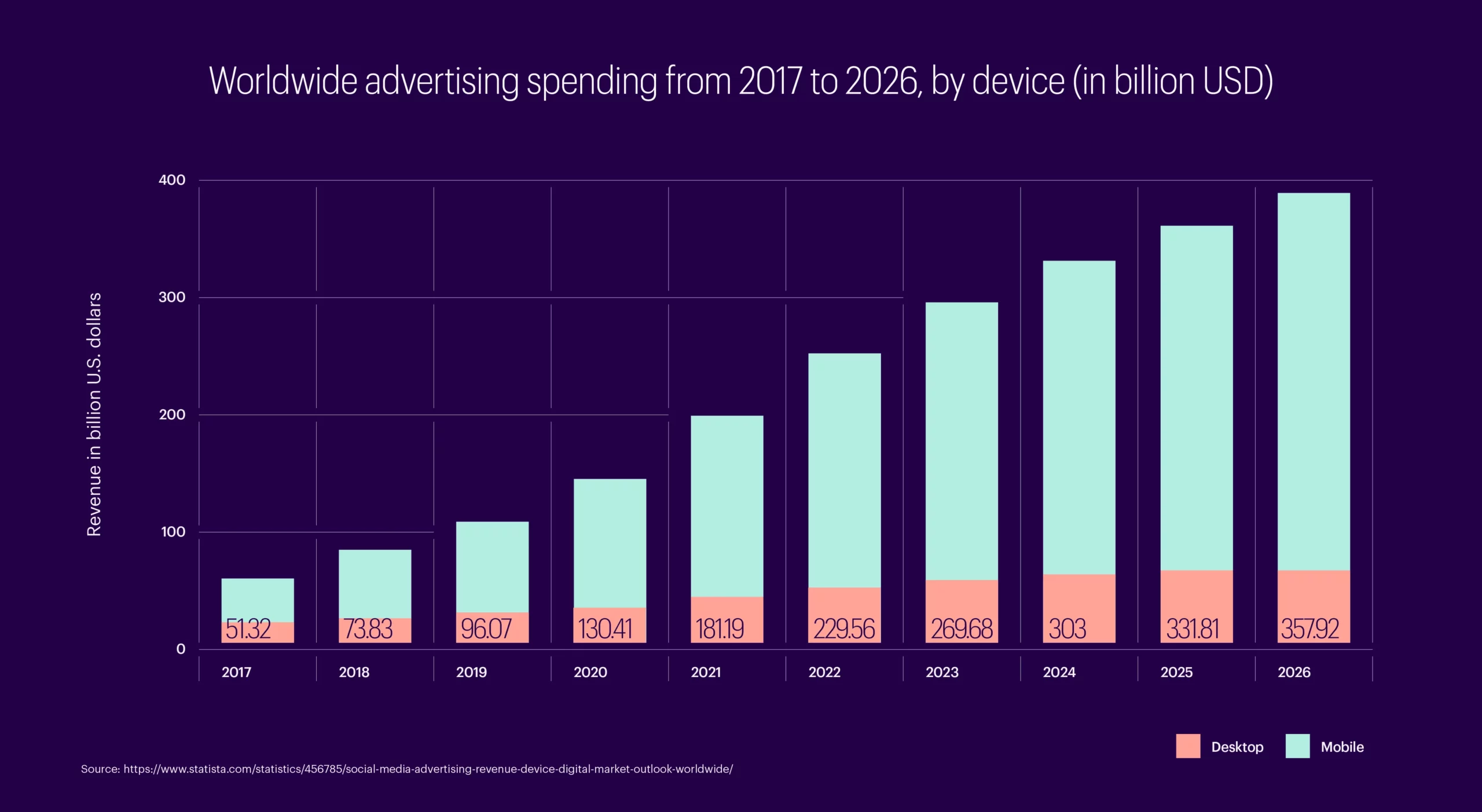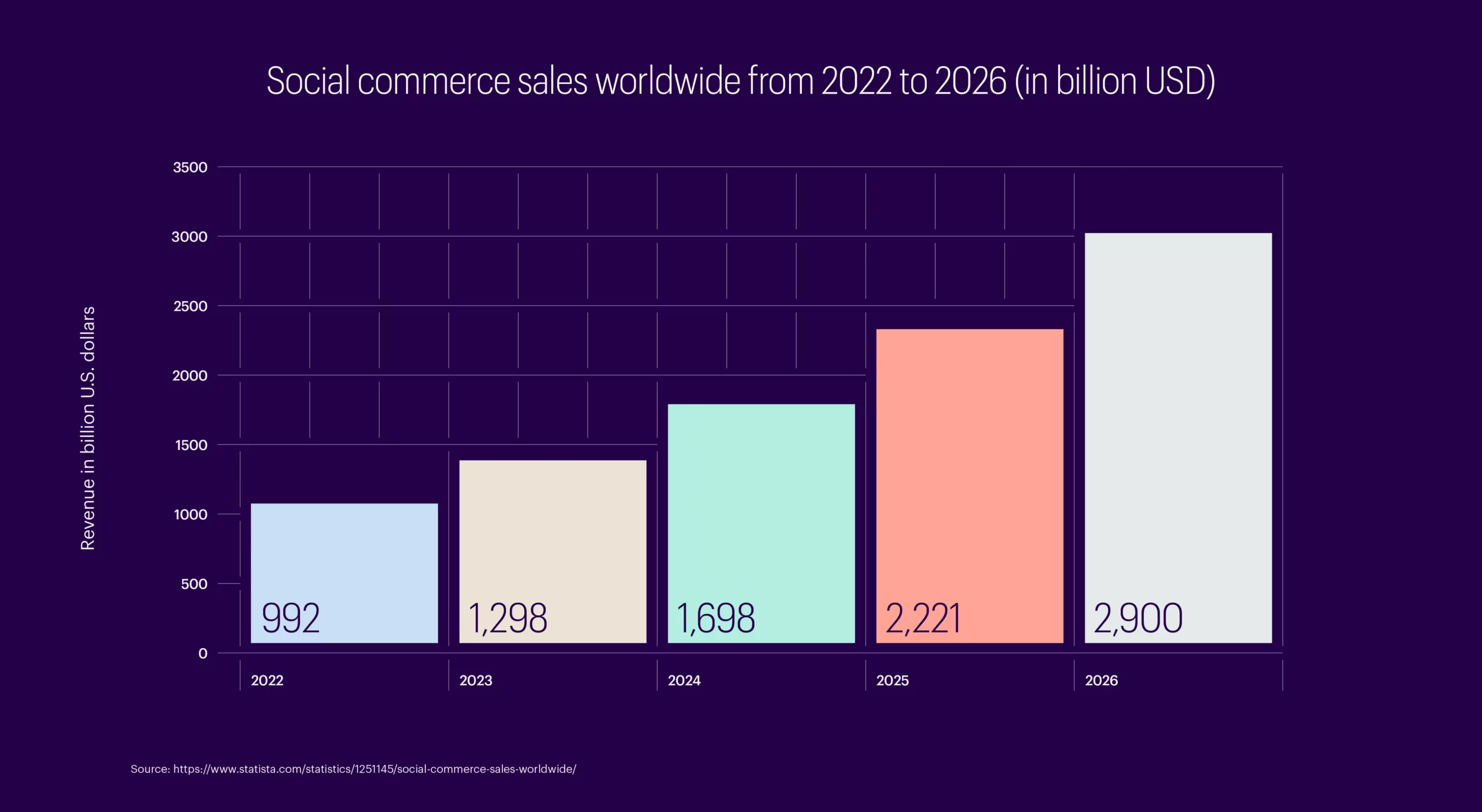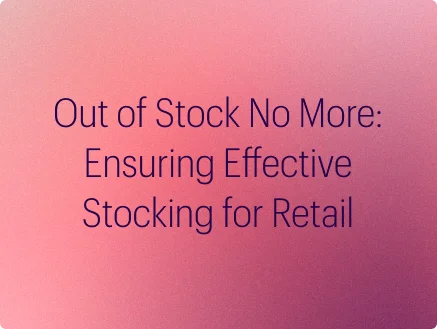For global retail brands, e-commerce and social media are a match made in heaven. Projected to reach USD 7.4 trillion by 2025 [1], the e-commerce domain has been consistently growing ever since its inception. Numerous retail brands have been competing to capture the e-commerce market and sell their products to more consumers. And social media has been aiding that by adding interactions and connectedness to the mix.
Featuring over 4 billion users and with a penetration rate of 58% [2], social media has evolved from a simple technology that connects people to one of the most powerful digital marketing tools. And as the digital population keeps growing, retail brands have realized that they can leverage social media to build an e-commerce model.
From an e-commerce perspective, social media has two key roles to play – marketing and commerce. In the initial days, retail brands were mainly focusing on the marketing facet of social media, as they were looking to tap into the huge user base and increase their brand awareness. With simple advertisements involving a call to action (CTA) that usually redirected users to the brand’s e-commerce website, retail brands were successful in tailoring marketing campaigns on social media.
However, with the adoption of data analytics, retail brands became more insight-oriented, and the nature of marketing through social media channels changed. Effectively using data helped retail brands track customer behavior and generate meaningful insights for consistently engaging with customers and maintaining a strong digital presence. Brands were able to track everything from customer demographics to their interests, preferences, interactions, and much more. As social media marketing evolved further, retail brands saw an opportunity to combine e-commerce and social media, paving the way for social commerce.
This article will explore social media marketing and social commerce in detail while highlighting how ensemble data science solutions have enabled social media to redefine retail e-commerce.
Social media marketing (SMM)
As we all know, social media marketing (SMM) is the use of social platforms to promote products or services, engage with existing customers, and reach potential customers. According to a 2020/21 survey among US consumers, more than 80% of them [3] reported that social media impacted their buying decisions. The survey also states that they have either researched or considered buying a particular product or service after seeing friends, family, or influencers post about it on social media.

As more retail brands started focusing on SMM, investments in this space have considerably increased. According to Statista, the global social media advertising market is forecasted to reach USD 358 billion by 2026 [4]. But at the same time, we must also not forget that the retail industry has low entry barriers [5], making SMM for retail incredibly tricky.
Redefining SMM
According to an industry report, the “AI in social media” market is expected to reach USD 3,714.89 million at a CAGR of 28.77% during the forecast period of 2021-2026 [6]. With the proliferation of social media channels and the vast amount of customer intelligence data generated due to it, custom machine learning applications can deliver smart solutions and optimize SMM.
Here are some of the ways in which SMM is transforming today and helping retail brands promote their business more effectively:
Effective content management:
Managing, targeting, scheduling, publishing, creating hashtags, etc., are some of the time-consuming and repetitive tasks involved in SMM. Retail marketers today possess the ability to automate these redundant tasks to improve operational efficiency by leveraging novel automation platforms.
Personalized product recommendations:
Using advanced Machine Learning algorithms, retail brands can analyze search history, page clicks, and social interactions to deliver personalized product recommendations on customers’ social media channels.
Gathering social intelligence:
AI-powered social monitoring tools can deliver insights by analyzing the brand’s social media profiles and audience. It will help brands track global mentions, emerging trends among customers, find new audiences to target, and even identify new avenues to promote the brand.
Improving influencer marketing:
Influencer marketing is a byproduct of burgeoning social media channels and their growing influence on people, especially the Gen Z population. And for retail brands, finding the right influencer that aligns with the brand image has been a huge challenge. With the help of AI and analytics, brands are able to bypass this hurdle.
Social commerce
Social commerce came into being primarily due to the emergence and growing popularity of social media marketing. When retail brands started advertising or promoting their products through different social media platforms, it was only a matter of time before they saw the opportunity to sell these products directly to customers without navigating them to the brand’s e-commerce website. Thus, the synergy of social media and e-commerce—or social commerce, in other words—became the go-to strategy for retail brands.
Global sales value through social commerce has been on the rise over the years. According to a market study, the estimated value will reach approximately USD 3 trillion by 2026 [7]. Facebook remains the most popular platform for retail brands for social commerce. However, with a retail-friendly interface and innovative features, platforms like TikTok and Instagram are slowly gaining popularity and driving engagement [8].

The future of social commerce
One of the key factors behind the increased adoption of social commerce is the growing involvement of advanced analytics and AI-powered solutions. And, as the analytics domain keeps expanding, the social commerce space is deftly positioned to evolve with it.
Here are some of the ways in which AI is bridging the gap between consumers and e-commerce brands, thereby reshaping the social commerce space:
1) Conversational AI for enhanced customer experience (CX).
As retail brands look to migrate away from a web-centric experience to a social-first approach, it is natural that the customer journey becomes disjointed and distributed. With AI-based conversational chatbots, brands can maintain a 360-degree view of the customer, stay active 24/7, and maintain an omnichannel presence.
Unlike traditional chatbots that follow a scripted approach, conversational AI delivers dynamic and highly personalized chats tailored to each user. An amalgamation of AI, Machine Learning, and Natural Language Processing (NLP), these new age chatbots are highly intuitive and keep customer care costs low while driving up selling opportunities through smart product recommendations.
2) Metaverse – The future of e-commerce?
Metaverse is the next big thing in social commerce. It is the perfect harmony of AI, Augmented Reality, and Virtual Reality, all co-existing in a decentralized online ecosystem based on blockchain technology. Even though it is still at an early development stage, this experiential marketing concept has piqued the interest of a lot of companies. For instance, one of the world’s largest art and luxury auction houses [9] has recently embraced the Metaverse technology. This auction house even set up a nonfungible tokens (NFT) marketplace featuring a carefully curated digital art catalog. While the long-term outlook of the Metaverse is yet to be determined, endorsement of it by key social media influencers has led to increasing consumer adoption.
The new wave of customers
As the social media and retail landscapes gradually merge, brands are entering a new era of AI-influenced marketing and commerce. From hyper-personalization and optimized influencer marketing to high-end chatbots and futuristic Metaverse technology, AI has encompassed both the marketing and commercial elements.
Nevertheless, several brands are still skeptical of fully embracing AI and social media to boost their retail brand value and revenue. And they might be missing out on a lot of engagement and visibility with a new wave of consumers. Gen Z digital natives hold immense buying power, and retail brands must think outside the box to cater to their preferences and demands. Implementing a carefully tailored social media strategy powered by AI will prove to be the secret to success for retail brands competing in this digital-first ecosystem.
This is the second article in our series focusing on e-commerce and online retail. Check out our other articles about the rise of chatbots in e-commerce and the Metaverse concept.
Follow us on social media to be the first to know when we publish.
Bibliography
1. Chevalier, Stephanie. “Global Retail E-Commerce Sales 2026.” Statista, September 21, 2022. https://www.statista.com/statistics/379046/worldwide-retail-e-commerce-sales/.
2. Dixon, Stacy Jo. “Topic: Social Media.” Statista, 2022. https://www.statista.com/topics/1164/social-networks/#topicOverview.
3. Pudvelis, Sara. “Matter Survey Reveals Consumers Find Influencers More Helpful and Trustworthy than Brands during the Pandemic.” Business Wire, May 26, 2020. https://www.businesswire.com/news/home/20200526005058/en/Matter-Survey-Reveals-Consumers-Find-Influencers-More-Helpful-and-Trustworthy-than-Brands-During-the-Pandemic.
4. Dencheva, Valentina. “Topic: Social Media Advertising and Marketing Worldwide.” Statista, 2022. https://www.statista.com/topics/1538/social-media-marketing/#topicOverview.
5. Gershon, Livia. “Study: Industries with Low Barriers to Entry.” CreditDonkey, March 29, 2013. https://www.creditdonkey.com/barriers-to-entry.html.
6. “AI in Social Media Market – Forecast Growth & Industry Trends.” AI in Social Media Market – Forecast Growth & Industry Trends, 2022. https://www.mordorintelligence.com/industry-reports/ai-market-in-social-media.
7. Chevalier, Stephanie. “Global Social Commerce Market Size 2022-2026.” Statista, September 2022. https://www.statista.com/statistics/1251145/social-commerce-sales-worldwide/.
8. Wong, Jessica. “Council Post: How Retailers Can Win at Social Commerce.” Forbes, March 21, 2022. https://www.forbes.com/sites/forbescommunicationscouncil/2022/03/17/how-retailers-can-win-at-social-commerce/?sh=695d44324885.
9. Haigney, Sophie. “Next Stop: The Metaverse.” Sothebys.com, December 24, 2021. https://www.sothebys.com/en/articles/next-stop-the-metaverse.


